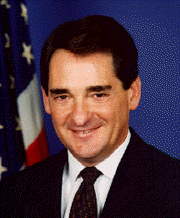
| News Release • Third District • Louisiana | |
| Congressman | |
| Billy Tauzin | |
|
 |
|
Tauzin Unveils Plan to Cut Taxes,
Save Schools and Libraries Program
WASHINGTON (July 23, 1998) -- Vowing to slash federal taxes on telephone bills and at the same time provide stable funding for Internet services for America's schools and libraries, Congressman Billy Tauzin (R-LA), chairman of the House Commerce Subcommittee on Telecommunications, today introduced legislation that will accomplish both.
In announcing his bill, the "Schools and Libraries Internet Access Act," Tauzin was joined by Senator Conrad Bums (R-MT), chairman of the Senate Commerce Subcommittee on Communications, who plans to offer companion legislation in the Senate, and Congressmen Jerry Weller (R-IL) and Kenny Hulshof (R-MO), both members of the House Ways and Means Committee.
According to projected 1999 telephone revenues, the Tauzin-Weller-Hulshof bill will cut consumer taxes by $3.3 billion a year and, at the same time, provide $1.7 billion a year for schools and libraries.
"In a nutshell, what we're doing is cutting taxes for nearly everyone in America and saving the E-rate program in the process," Congressman Tauzin explained.
"In my opinion, the present Schools and Libraries Corporation, which oversees the program, is not legal, and the so-called 'Gore tax,' which funds the program, is not constitutional. If telephone companies successfully challenge this program in court, there will be no money, not a penny, available for Internet services for schools and libraries. This bill guarantees funding for these vitally important educational services," Tauzin added.
The current program is at risk, Tauzin continued, because of these nagging legal questions. "No where in the Constitution is the FCC, nor any other federal agency, given the power to levy, raise or collect taxes. We had a revolt in this country once over taxation without representation. This is a serious Constitutional question, relating to separation of powers. Our bill resolves the problem by paying for the program with an expressed tax approved by Congress."
Here are the highlights of the Tauzin-Weller-Hulshof bill:
"What we're talking about is saving consumers approximately $5.3 billion a year and dedicating $1.7 billion to education," Congressman Tauzin continued. "In politics, that's known as a win-win. Our tax cut plan is broad-based. Nearly every family and business in the United States will see a real reduction in the total cost of their telecommunications services.
"The bottom line is this: We re-establish Congressional control over the schools and libraries program, and we begin phasing out an antiquated tax which disproportionately impacts the poor. That's a common-sense solution to a serious problem."